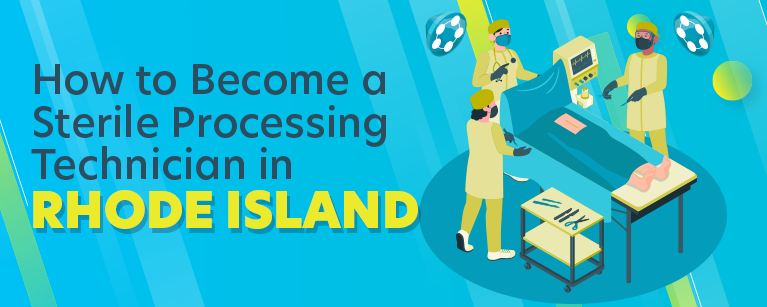
Rhode Island has a wealth of professions, one of which is the vital job of a Sterile Processing Technician.
As a part of the medical services team, you will ensure that essential clinical equipment is sanitized and prepared for use.
How about we investigate how to enter the role of a Sterile Processing Technician in Rhode Island?
Table of Contents
How to Become – Step by Step
Understand the Role
It’s vital to understand what being a Sterile Processing Technician entails.
Sterile Processing Technicians (SPTs) are essential to patient safety and well-being.
They guarantee that medical equipment, from forceps to complex mechanical hardware, is cleaned, disinfected, and free from any microorganisms that could cause contaminations, as this could bring about highly unexpected problems for patients.
Completing a High School Diploma / GED
Firstly, obtaining a high school diploma or GED is a must.
During high school, prioritize subjects like biology, chemistry, and health.
These will give you information about the human body, diseases, and the fundamentals of clinical equipment.
Likewise, consider joining fitness centers or associations to get a flavor of medical services jobs in Rhode Island.
Enroll in a Training Program
To become proficient, you must enroll in a specialized training program.
These projects usually last a few months to a year; these give you the theoretical information and valuable skills needed.
You’ll learn about the different sanitization strategies, types of medical equipment, quality assurance, and disease control.
Furthermore, these programs often incorporate hands-on training, allowing students to practice their skills in real-life settings.
Get Certified
Certification is a must to show your competence and dedication to the field.
While not legally mandatory in Rhode Island, most employers prefer certified technicians because it assures them of the individual’s expertise.
You can gain a Certification through organizations like the International Association of Healthcare Central Service Materiel Management (IAHCSMM) or the Certification Board for Sterile Processing and Distribution (CBSPD).
These certifications will involve completing coursework, taking an examination, and demonstrating your practical experience.
Gain Experience Post-certification
Many organizations in Rhode Island might require fresh graduates to start as interns or in entry-level positions to familiarize themselves with the workplace environment.
These roles are invaluable as they provide insights into the day-to-day challenges and workings of the job.
Apprenticeships
Apprenticeships offer a practical route for individuals aiming to become Sterile Processing Technicians; they ensure that participants acquire the knowledge and hands-on experience needed within the profession.
Why Consider an Apprenticeship?
- Integrated Learning: Apprenticeships provide a holistic learning experience. As an apprentice, you’ll not only study the theoretical parts of sterilization and equipment handling but also work in real-world healthcare settings under the supervision of experienced professionals.
- Earn While You Learn: Unlike traditional educational programs where students pay tuition, apprentices usually receive a stipend or wage during training.
- Networking: Working closely with seasoned Sterile Processing Technicians and other healthcare professionals offers invaluable networking opportunities. Building these relationships can be crucial when seeking permanent employment after completing the apprenticeship.
Finding an Apprenticeship in Rhode Island
- State Resources: The Rhode Island Department of Labor and Training (DLT) is a good starting point. They often have listings of available apprenticeships across various fields, including healthcare.
- Local Hospitals and Clinics: Many healthcare institutions in Rhode Island recognize the value of apprenticeships and might offer programs tailored to Sterile Processing Technicians.
- Sterile Technician Associations: Organizations like the International Association of Healthcare Central Service Materiel Management (IAHCSMM) or the Certification Board for Sterile Processing and Distribution (CBSPD) may have apprenticeship information or partnerships.
- Community Colleges and Vocational Schools: Some educational institutions might collaborate with healthcare facilities to offer apprenticeship programs.
Maintain Certification
The world of healthcare is forever changing, so you must remain competent and updated.
Sterile Processing Technicians need to be doing ongoing learning and continue their professional development.
Certifications typically come with a validity period, after which you must renew them.
Renewal might involve taking refresher courses, attending workshops, or re-taking the certification exam.
Staying updated ensures you continue to provide the best services and maintain high patient safety standards.
Securing a Job as a Sterile Processing Technician in Rhode Island
Candidates should tailor their resumes to reflect relevant experience and certifications.
Key strategies include exploring online job websites like Indeed and LinkedIn for vacancies and directly contacting healthcare networks such as Lifespan and Care New England.
Additionally, professional organizations related to the field, like IAHCSMM and CBSPD, offer valuable job boards and networking events to give you an edge in the job market.
Particular recruitment offices can help, frequently assisting candidates through the job search by looking into work in Rhode Island’s medical care area.
Sterile Processing Technician Schools in Rhode Island
Rhode Island Community College:
Duration: 9 months
Cost: Approximately $4,500
Program Highlights: Provides hands-on experience, prepares students for certification exams, and offers internship opportunities.
Ashworth College:
Online Course
Duration: 1 year
Cost: Roughly $1,000 (Full Amount) or $1300 (Monthly payments of $59)
Program Highlights: HSPA certified, Textbook, Student Portal, and digital access to thousands of research sources.
New England Insitute of Technology:
Duration: 18 months
Cost: Contact the college directly.
Program Highlights: Offers 160 hours within a surgical lab and a 20-week Clinical Externship.
Another option below:
Front Range Community College:
| School Name | Address |
|---|---|
| Rhode Island Community College | 1 John H Chafee Blvd, Newport, RI 02840, United States |
| Ashworth College | 5051 Peachtree Corners Cir Suite 200, Norcross, GA 30092, United States |
| New England Insitute of Technology | 1 New England Tech Boulevard, East Greenwich, RI 02818, United States |
| Front Range Community College | 3645 W 112th Ave, Westminster, CO 80031, United States |
Salary
The average salary in Rhode Island for a Sterile Processing Technician is approximately $41,010 per year.
This figure can vary based on experience, Certification, and the employing institution.
Annual Salary Range:| Location | Avg. Annual Salary |
|---|---|
| Providence | $47,724 |
| Warwick | $47,724 |
| Cranston | $47,724 |
| Pawtucket | $47,724 |
| East Providence | $47,724 |
| Woonsocket | $47,678 |
| Coventry | $47,633 |
| North Providence | $47,724 |
| Cumberland | $47,724 |
| West Warwick | $47,724 |
Regional Salary in Rhode Island
| Region | Employed | Avg. Annual Salary | Avg. Hourly Pay | Top 10% Annual Salary | Bottom 10% Annual Salary |
|---|---|---|---|---|---|
| Providence-Warwick, RI-MA | 320 | $48,960 | $23.54 | $58,910 | $36,810 |
* Employment conditions in your area may vary.
Frequently Asked Questions
Is Certification mandatory to work in Rhode Island?
While not legally mandatory, most employers in Rhode Island prefer hiring certified Sterile Processing Technicians
Can I work in another state with my Rhode Island certification?
While the Certification is nationally recognized, it’s essential to check specific state requirements, as they might differ.
Are there opportunities for growth in this profession in Rhode Island?
Absolutely!
With experience and additional training, technicians can move into supervisory roles or specialize in areas like endoscopy or open-heart surgery equipment.
Sterile Processing Technician Info by State
- Alabama
- Alaska
- Arizona
- Arkansas
- California
- Colorado
- Connecticut
- Delaware
- Florida
- Georgia
- Hawaii
- Idaho
- Illinois
- Indiana
- Iowa
- Kansas
- Kentucky
- Louisiana
- Maine
- Maryland
- Massachusetts
- Michigan
- Minnesota
- Mississippi
- Missouri
- Montana
- Nebraska
- Nevada
- New Hampshire
- New Jersey
- New Mexico
- New York
- North Carolina
- North Dakota
- Ohio
- Oklahoma
- Oregon
- Pennsylvania
- Rhode Island
- South Carolina
- South Dakota
- Tennessee
- Texas
- Utah
- Vermont
- Virginia
- Washington
- West Virginia
- Wisconsin
- Wyoming









